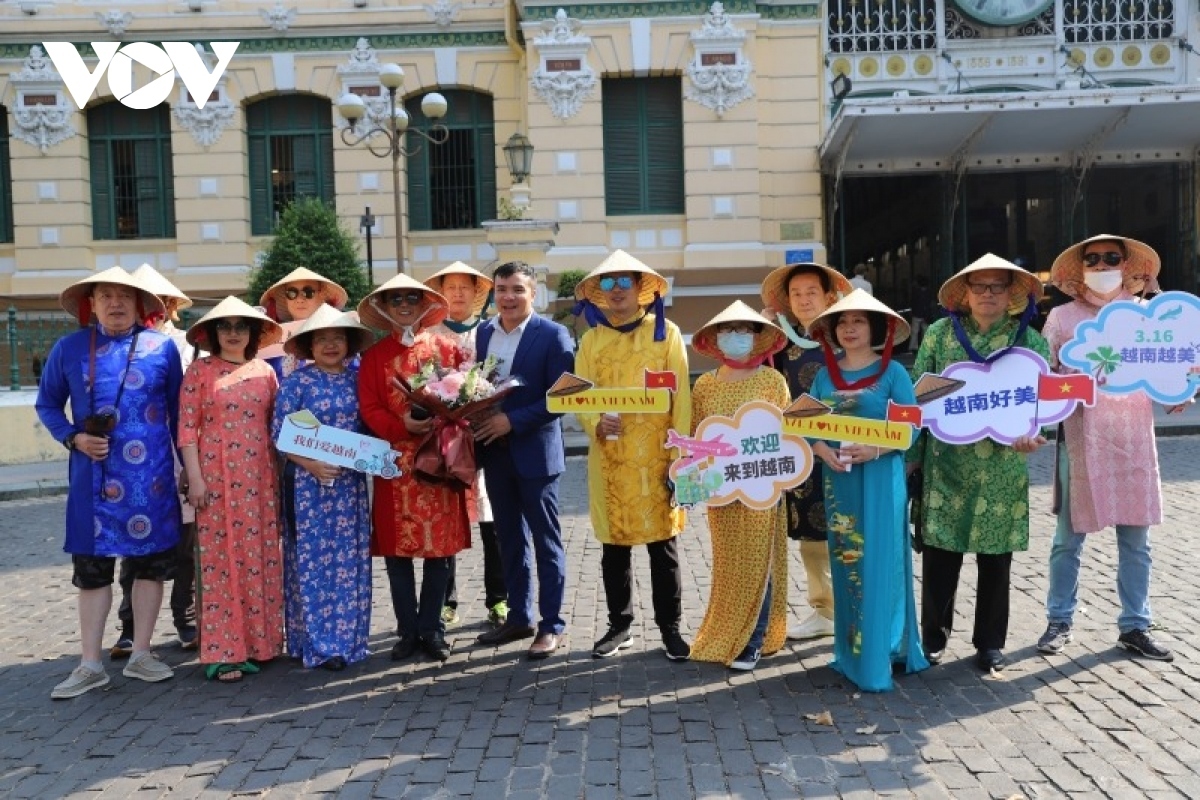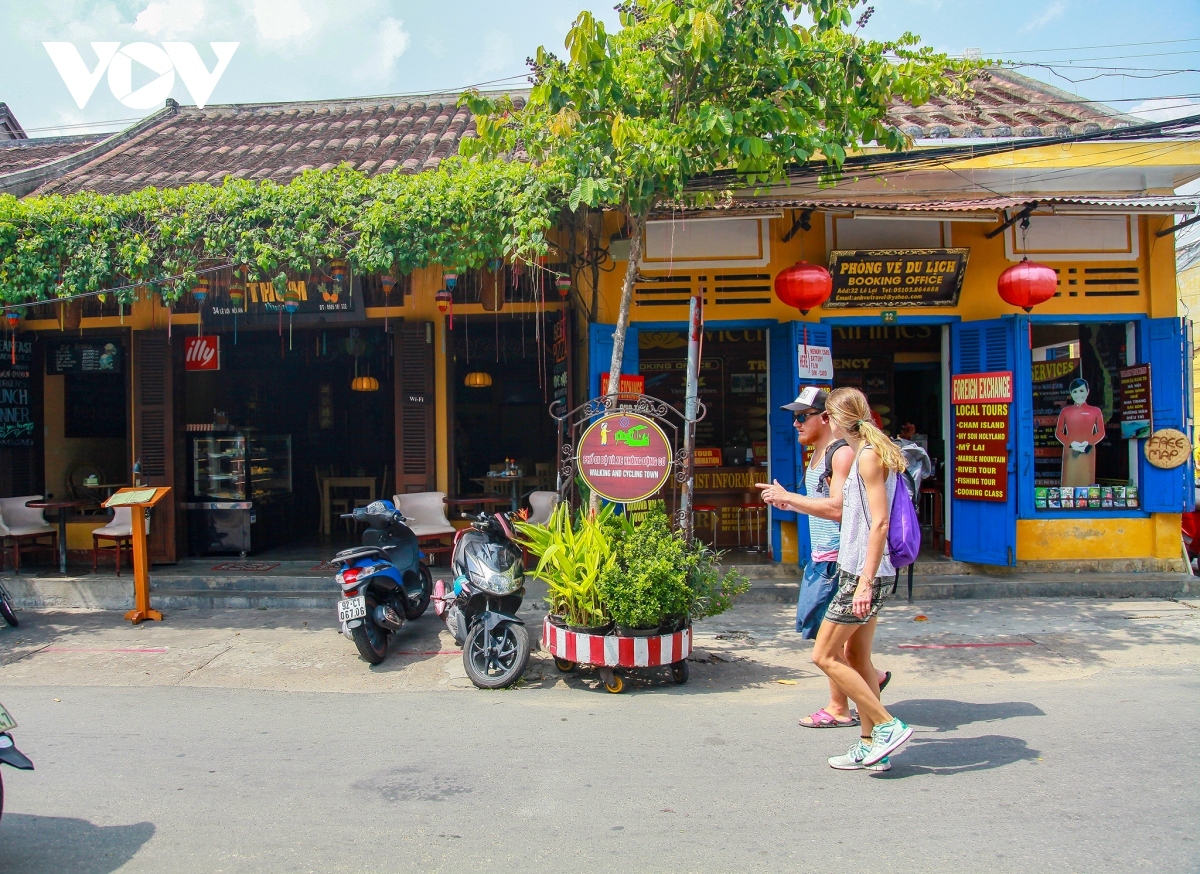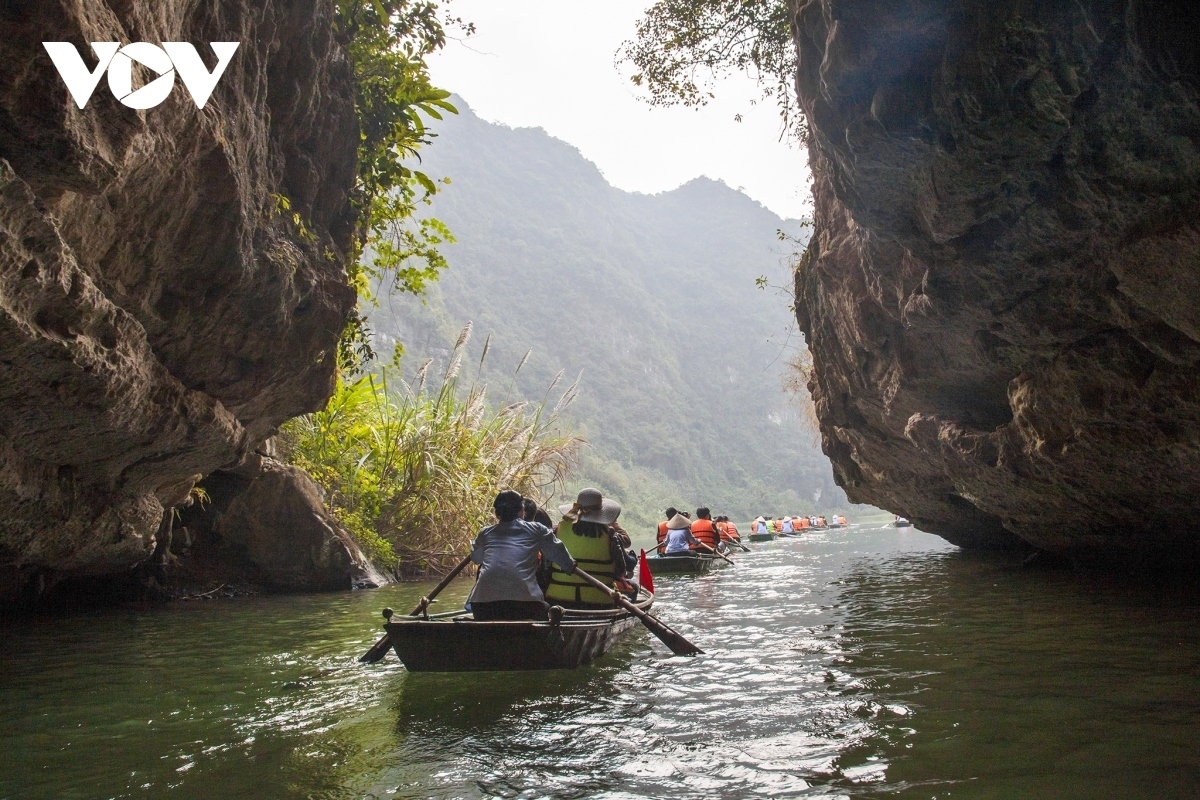Vietnam’s tourism industry is gathering full steam from the COVID-19 inflicted hiatus thanks to its new visa waiver policy, high safety level, new attractive products and tourism promotion efforts locally and globally.
Effective visa waiver policy

A group of Chinese tourists return to Ho Chi Minh City of Vietnam in the post-pandemic period
Vietnam has waived its visa policy since August 15, 2023, helping the local tourism industry to gradually recover from the staggering impact of the COVID-19 pandemic. Accordingly, it has applied electronic visas (e-visa) to citizens of all countries and territories, and increased the temporary residence period from 30 to 90 days, with multiple entries and exits. It has also increased the temporary stay period of citizens from 13 countries with unilateral visa exemption to 45 days.
Statistics show that the country welcomed nearly 16 million foreign arrivals from August 1, 2023, to July 31, 2024, equivalent to nearly 99% compared to the same period from 2018 to 2019 before COVID-19 broke out. The past seven months of the year alone also saw nearly 10 million foreign visitors choose Vietnam as a destination for their holiday, representing an annual increase of 51%, though there are a couple of months to go before the peak season of receiving foreign visitors.
Vietnam became an attractive destination for travelers from the Republic of Korea (RoK), China, Europe, and other markets globally in the seven-month span. Among the 13 countries that enjoy unilateral visa exemption, the RoK was the largest market supplying visitors, followed by Japan, Russia, Italy, Spain, France, Germany, Sweden, Denmark, the UK and Norway.
A safe destination for tourism

Foreign travellers tour around the Old Quarter of the ancient town of Hoi An - a UNESCO World Heritage Site in central Vietnam
Besides its poetic natural beauty, Vietnam is also known worldwide by travelers for its high levels of safety. Best Diplomats, a New-York based organisation on training future diplomats, recently ranked Vietnam eighth on the list of the 10 safest countries in Asia in 2024. The organisation hailed the country for its beauty, rich culture, and delicious cuisine.
This is not the first time that Vietnam has been listed among the top safe tourist destinations in the world. In January, Travel Off Path, one of the largest travel information sites in North America, also rated the country as one of the safest and most attractive tourist destinations in Asia. Also at the start of the year, Vietnam was the only Southeast Asian representative to feature in the UK magazine Time Out’s list of the nine safest destinations in the world for solo female travel. The safety level of Vietnamese provinces and cities was highly appreciated thanks to factors such as low crime rates and friendly people.
Many tourist destinations throughout the country have been recommended to readers of reputable magazines and organizations. Best Diplomats suggested Ha Long Bay - a UNESCO World Natural Heritage site that is famous for its limestone islands and clear turquoise water - as one of the safest tourist destinations in Vietnam that foreign travelers should visit. Previously, Ha Long Bay also reached the top 25 most popular destinations in the world by Tripadvisor.
In a study conducted early this year, US website Smoky Mountains pointed out that the ancient town of Hoi An in central Vietnam topped a global list of safest places for solo travelers. The World Heritage site not only has the lowest crime rate at 6.25 compared to 84.51 of Lima in Peru, but also offers pleasant experiences through its mild climate, affordable services, and unique indigenous cultural experiences.
Indeed, in the Global Peace Index (GPI) ranking announced by the Institute of Economics & Peace, headquartered in Sydney, Australia, in 2023, Vietnam rose to position 41st out of 163 countries and territories on the list, up three notches compared to 2022. In Southeast Asia alone, the Vietnamese peace index was ranked third, after Singapore and Malaysia.
Attractive tourism products

Visitors can take a boat tour to savour scenic views of Tam Coc-Bich Dong cave in Ninh Binh
Many new and diverse tourism products have been created, offering new experiences to tourists as a way to stimulate the local tourism industry in recent times.
The night market model has been developed in various localities across the country, such as Ha Noi, Ninh Binh, Sa Pa, Quang Ninh, Hue, Da Nang, Nha Trang, Ho Chi Minh City, and Kien Giang, making these localities must-visit destinations among local and foreign travelers. Visitors to the night market not only sample special delicacies and buy souvenirs, but also relax and enjoy many unique experiences. However, tourism service providers have been advised to bring into full play the strengths of local cuisine and culture, thereby turning the night market into a typical tourism product.
Meanwhile, tours of Ninh Binh province in the north via boat and bike, as well as a canyoning tour of the popular tourist resort of Da Lat in the Central Highlands, were recently named among the top 25 Best Nature and Outdoor Experiences in the world by the world’s leading tourism platform Tripadvisor. The world’s leading online travel platform Agoda also voted Nha Trang in central Vietnam as one of the five most beautiful diving destinations in Asia next to Bali of Indonesia, Phuket of Thailand, Okinawa of Japan, and Cebu of the Philippines.
Alongside diversifying tourism products and improving service quality, Vietnam is making great strides in increasing tourism promotion abroad. This year, the Vietnam National Authority of Tourism launched tourism promotions in markets such as ASEAN, China, India, Australia, and the US. It is also giving advice regarding the appointment of Vietnamese Tourism Ambassadors in some key markets in an effort to attract more foreign visitors to the country.
Despite making gains, the local tourism industry is required to address shortcomings, by offering stable prices in tourist sites, promoting connectivity among various crafts to create distinctive products, and developing tourism in close association with environmental protection.